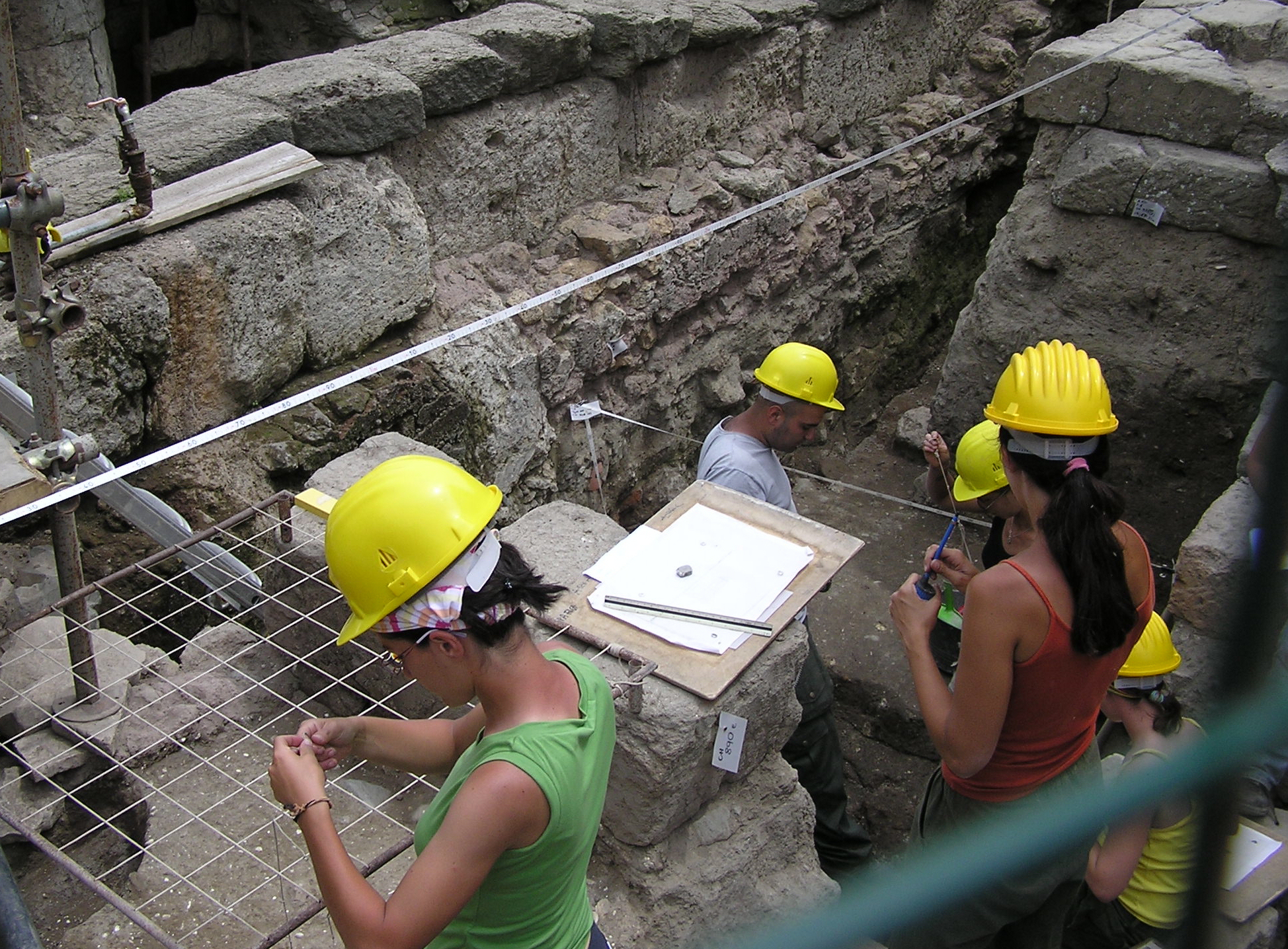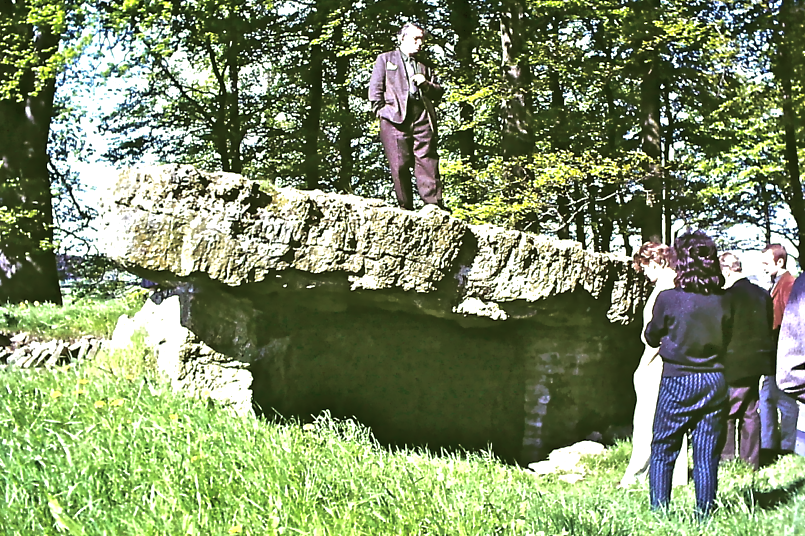|
Disney Professorship Of Archaeology
The Disney Professorship of Archaeology is an endowed chair in archaeology at the University of Cambridge. It was endowed by English barrister and antiquarian John Disney in 1851 with a donation of £1,000. He arranged for a further £3,500 bequest upon his death in 1857. Disney Professors have also served as the Directors of the McDonald Institute for Archaeological Research, which was founded in 1990. List of Disney Professors of Archaeology * 1851–1865 John Howard Marsden * 1865–1879 Churchill Babington * 1879–1887 Percy Gardner * 1887–1892 George Forrest Browne * 1892–1926 William Ridgeway * 1926–1938 Ellis Minns * 1939–1952 Dorothy Garrod * 1952–1974 Grahame Clark * 1974–1981 Glyn Daniel * 1981–2004 Colin Renfrew * 2004–2014 Graeme Barker Graeme William Walter Barker, (born 23 October 1946) is a British archaeologist, notable for his work on the Italian Bronze Age, the Roman occupation of Libya, and landscape archaeology. Having taught at the ... [...More Info...] [...Related Items...] OR: [Wikipedia] [Google] [Baidu] |
John Disney, By Maull & Polyblank
John is a common English name and surname: * John (given name) * John (surname) John may also refer to: New Testament Works * Gospel of John, a title often shortened to John * First Epistle of John, often shortened to 1 John * Second Epistle of John, often shortened to 2 John * Third Epistle of John, often shortened to 3 John People * John the Baptist (died ), regarded as a prophet and the forerunner of Jesus Christ * John the Apostle (died ), one of the twelve apostles of Jesus Christ * John the Evangelist, assigned author of the Fourth Gospel, once identified with the Apostle * John of Patmos, also known as John the Divine or John the Revelator, the author of the Book of Revelation, once identified with the Apostle * John the Presbyter, a figure either identified with or distinguished from the Apostle, the Evangelist and John of Patmos Other people with the given name Religious figures * John, father of Andrew the Apostle and Saint Peter * Pope John (disambigu ... [...More Info...] [...Related Items...] OR: [Wikipedia] [Google] [Baidu] |
Grahame Clark
Sir John Grahame Douglas Clark (28 July 1907 – 12 September 1995), who often published as J. G. D. Clark, was a British archaeologist who specialised in the study of Mesolithic Europe and palaeoeconomics. He spent most of his career working at the University of Cambridge, where he was appointed Disney Professor of Archaeology from 1952 to 1974 and Master of Peterhouse from 1973 to 1980. Born in Kent to an upper-middle-class family, Clark developed an early interest in archaeology through his collection of prehistoric flint tools. After an education at Marlborough College, he proceeded to Peterhouse in the University of Cambridge, there attaining both his undergraduate and then doctoral degree. For the latter, he produced a thesis and published monograph focusing on Mesolithic Britain. In 1932, he co-founded the Fenland Research Committee, through which he excavated several prehistoric sites in the East Anglian Fens. He was also a senior member of the Prehistoric Society of ... [...More Info...] [...Related Items...] OR: [Wikipedia] [Google] [Baidu] |
1851 Establishments In England
Events January–March * January 11 – Hong Xiuquan officially begins the Taiping Rebellion in China, one of the bloodiest revolts that would lead to 20 million deaths. * January 15 – Christian Female College, modern-day Columbia College (Missouri), Columbia College, receives its charter from the Missouri General Assembly. * January 23 – The flip of a coin, subsequently named the Portland Penny, determines whether a new city in the Oregon Territory will be named after Boston, Massachusetts, or Portland, Maine, with Portland, Oregon, Portland winning. * January 28 – Northwestern University is founded in Illinois. * February 1 – ''Brandtaucher'', the oldest surviving submersible craft, sinks during acceptance trials in the German port of Kiel, but the designer, Wilhelm Bauer, and the two crew escape successfully. * February 6 – Black Thursday (1851), Black Thursday occurs in Australia as Bushfires in Australia, bushfires sweep across ... [...More Info...] [...Related Items...] OR: [Wikipedia] [Google] [Baidu] |
Faculty Of Human, Social, And Political Science, University Of Cambridge
The Faculty of Human, Social, and Political Science at the University of Cambridge was created in 2011 out of a merger of the Faculty of Archaeology and Anthropology and the Faculty of Politics, Psychology, Sociology and International Studies. According to the Cambridge HSPS website: graduates pursue careers in "research (both academic and policy research), the Civil Service (including the Foreign Office), journalism, management consultancy, museums, conservation and heritage management, national and international NGOs and development agencies, the Law, teaching, publishing, health management, and public relations." The Faculty houses four departments: the Department of Archaeology, the Department of Social Anthropology, the Department of Politics and International Studies and the Department of Sociology. Each of these departments has a worldwide reputation for teaching and research, and the undergraduate curriculum (Tripos) is designed to serve not only students who have clear ... [...More Info...] [...Related Items...] OR: [Wikipedia] [Google] [Baidu] |
Professorships At The University Of Cambridge
Professor (commonly abbreviated as Prof.) is an Academy, academic rank at university, universities and other tertiary education, post-secondary education and research institutions in most countries. Literally, ''professor'' derives from Latin as a 'person who professes'. Professors are usually experts in their field and teachers of the highest rank. In most systems of List of academic ranks, academic ranks, "professor" as an unqualified title refers only to the most senior academic position, sometimes informally known as "full professor". In some countries and institutions, the word ''professor'' is also used in titles of lower ranks such as associate professor and assistant professor; this is particularly the case in the United States, where the unqualified word is also used colloquially to refer to associate and assistant professors as well, and often to instructors or lecturers. Professors often conduct original research and commonly teach undergraduate, Postgraduate educa ... [...More Info...] [...Related Items...] OR: [Wikipedia] [Google] [Baidu] |
Archaeological Organizations
Archaeology or archeology is the study of human activity through the recovery and analysis of material culture. The archaeological record consists of Artifact (archaeology), artifacts, architecture, biofact (archaeology), biofacts or ecofacts, archaeological site, sites, and cultural landscapes. Archaeology can be considered both a social science and a branch of the humanities. It is usually considered an independent academic discipline, but may also be classified as part of anthropology (in North America – the four-field approach), history or geography. The discipline involves Survey (archaeology), surveying, Archaeological excavation, excavation, and eventually Post excavation, analysis of data collected, to learn more about the past. In broad scope, archaeology relies on cross-disciplinary research. Archaeologists study human prehistory and history, from the development of the first stone tools at Lomekwi in East Africa 3.3 million years ago up until recent decades. A ... [...More Info...] [...Related Items...] OR: [Wikipedia] [Google] [Baidu] |
Archaeology Of The United Kingdom
Archaeology or archeology is the study of human activity through the recovery and analysis of material culture. The archaeological record consists of artifacts, architecture, biofacts or ecofacts, sites, and cultural landscapes. Archaeology can be considered both a social science and a branch of the humanities. It is usually considered an independent academic discipline, but may also be classified as part of anthropology (in North America – the four-field approach), history or geography. The discipline involves surveying, excavation, and eventually analysis of data collected, to learn more about the past. In broad scope, archaeology relies on cross-disciplinary research. Archaeologists study human prehistory and history, from the development of the first stone tools at Lomekwi in East Africa 3.3 million years ago up until recent decades. Archaeology is distinct from palaeontology, which is the study of fossil remains. Archaeology is particularly important for lear ... [...More Info...] [...Related Items...] OR: [Wikipedia] [Google] [Baidu] |
Cyprian Broodbank
Cyprian Broodbank, (born 26 December 1964) is a British archaeologist and academic. Since October 2014, he has been Disney Professor of Archaeology at the University of Cambridge and director of the McDonald Institute for Archaeological Research. From 2010 to 2014, he was Professor of Mediterranean Archaeology at University College London. Early life and education Broodbank was born on 26 December 1964. He studied modern history at the University of Oxford, graduating in 1986 with a Bachelor of Arts (BA) degree. He then went on to study for a Master of Arts (MA) degree in Aegean and Anatolian prehistory at the University of Bristol, graduating in 1987. He undertook postgraduate study at the Faculty of Classics, University of Cambridge, and completed his Doctor of Philosophy (PhD) degree in 1996. His supervisor was John F. Cherry, and his doctoral thesis was titled ''This small world the great: an island archaeology of the early Cyclades''. Academic career Broodbank began hi ... [...More Info...] [...Related Items...] OR: [Wikipedia] [Google] [Baidu] |
Graeme Barker
Graeme William Walter Barker, (born 23 October 1946) is a British archaeologist, notable for his work on the Italian Bronze Age, the Roman occupation of Libya, and landscape archaeology. Having taught at the University of Sheffield and the University of Leicester, he was Disney Professor of Archaeology at the University of Cambridge from 2004 to 2014. Early life and education Barker was born on 23 October 1946. He was educated at Alleyn's School, then a direct grant grammar school in Dulwich. He studied for the classical tripos at St John's College, Cambridge, graduating with a Bachelor of Arts (BA) degree; as per tradition, his BA was promoted to a Master of Arts (MA Cantab) degree. He remained at Cambridge to take his Doctor of Philosophy (PhD) degree, which he completed in 1973 with a doctoral thesis titled "''Prehistoric economies and cultures in Central Italy.''". Academic career In 1972, Barker joined the University of Sheffield as a lecturer in prehistory and archaeolog ... [...More Info...] [...Related Items...] OR: [Wikipedia] [Google] [Baidu] |
Colin Renfrew
Andrew Colin Renfrew, Baron Renfrew of Kaimsthorn, (25 July 1937 – 24 November 2024) was a British archaeologist, paleolinguist and Conservative peer noted for his work on radiocarbon dating, the prehistory of languages, archaeogenetics, neuroarchaeology, and the prevention of looting at archaeological sites. Renfrew was also the Disney Professor of Archaeology at the University of Cambridge and Director of the McDonald Institute for Archaeological Research, and was a Senior Fellow of the McDonald Institute for Archaeological Research. Early life and education Renfrew was educated at St Albans School, Hertfordshire (where one of the houses is named after him) and from 1956 to 1958 did National Service in the Royal Air Force. He then went up to St John's College, Cambridge, where he first read Natural Sciences, and then Archaeology and Anthropology, graduating in 1962. He was elected president of Cambridge Union in 1961 and was a member of the University of Cambridg ... [...More Info...] [...Related Items...] OR: [Wikipedia] [Google] [Baidu] |
Glyn Daniel
Glyn Edmund Daniel (23 April 1914 – 13 December 1986) was a Welsh scientist and archaeologist who taught at Cambridge University, where he specialised in the European Neolithic period. He was appointed Disney Professor of Archaeology in 1974 and edited the academic journal '' Antiquity'' from 1958 to 1985. In addition to early efforts to popularise archaeological study and antiquity on radio and television, he edited several popular studies of the fields. He also published mysteries under the pseudonym Dilwyn Rees. Early life and education Daniel was born in Lampeter Velfrey, Pembrokeshire, a small village between Narberth and Whitland in south-west Wales, as an only child. His father, John Daniel, was the village schoolmaster there. When Glyn Daniel was five he moved with his parents to Llantwit Major in the Vale of Glamorgan. He attended Barry County School for Boys in Barry, where his academic ability led to him being awarded a State Scholarship (which enabled him t ... [...More Info...] [...Related Items...] OR: [Wikipedia] [Google] [Baidu] |





